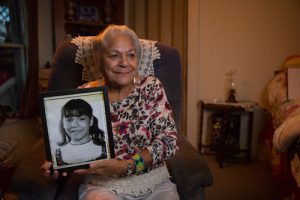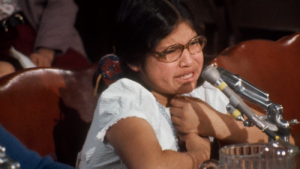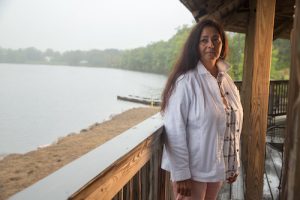Communiqué
“Dawnland” on Independent Lens | November 5
< < Back toDawnland Premieres on Independent Lens Monday, November 5, 2018 on PBS
Follow the First Government-Endorsed Truth and Reconciliation Commission in the United States as Maine Investigates the Devastating
Impacts of Native American Child Removal
Dawnland reveals the untold story of Indigenous child removal in the United States through the first government-endorsed truth and reconciliation commission (TRC) in the nation, tasked with investigating the devastating impact of Maine’s child welfare practices on Native American communities. With exclusive access to this groundbreaking process and never-before-seen footage, Dawnland bears witness to intimate, sacred moments of truth-telling and healing. Directed by Adam Mazo and Ben Pender-Cudlip, the film premieres on Independent Lens Monday, November 5, 2018, 10:00-11:00 PM as part of Native American Heritage Month programming on PBS.
 For most of the 20th century, government agents systematically forced Native American children from their homes and placed them with white families. As recently as the 1970s, one in four Native children nationwide were living in non-Native foster care, adoptive homes, or boarding schools. Many children experienced shattering emotional and physical harm by adults who mistreated them and tried to erase their cultural identity. Now, for the first time, they are being asked to share their stories.
For most of the 20th century, government agents systematically forced Native American children from their homes and placed them with white families. As recently as the 1970s, one in four Native children nationwide were living in non-Native foster care, adoptive homes, or boarding schools. Many children experienced shattering emotional and physical harm by adults who mistreated them and tried to erase their cultural identity. Now, for the first time, they are being asked to share their stories.
The historic investigation by the Maine Wabanaki-State Child Welfare Truth and Reconciliation Commission represented a groundbreaking moment in the history of tribal-state relations. From 2013 to 2015, Native and non-Native commissioners travelled across Maine, gathering testimony about the agonizing impacts of the state’s child welfare practices on families in Maliseet, Micmac, Passamaquoddy, and Penobscot tribal communities, which together comprise the Wabanaki people.
The TRC discovered that state power continues to be used to break up families, threatening the very existence of the Wabanaki people. Is it possible to right this wrong and turn around a broken child welfare system? Dawnland examines the immense challenges faced by the commission as it works toward truth, reconciliation, and the survival of all Indigenous peoples. By exploring what happened in Maine, the film also provides the opportunity to raise awareness about this nationwide issue, which continues to impact families and children.
“As America struggles with the issue of forced separation of children from their parents, it may surprise many people to learn that the recent events happening on our Mexican border are just the latest chapter in the U.S. government’s under-reported history of using children as a pawn for political gain,” said Lois Vossen, Independent Lens executive producer. “It’s like déjà vu when we compare today’s news reports with the rediscovered riveting footage from the 1974 Congressional Hearings that revealed how Wabanaki Indian children were forcibly removed from their homes by Maine’s child welfare system. Dawnland is a living example that those who don’t learn from history are doomed to repeat it.”
About the Participants (in alphabetical order):
Dawn Neptune Adams (Penobscot) is a leading environmental activist. As a foster child she had her mouth washed out with soap for speaking Penobscot and survived horrific abuse but has now reconnected with her community.
 Denise Altvater (Passamaquoddy) became a godmother of the TRC, a tireless leader who has served Wabanaki families for decades, in spite of being removed from her home at a young age.
Denise Altvater (Passamaquoddy) became a godmother of the TRC, a tireless leader who has served Wabanaki families for decades, in spite of being removed from her home at a young age.
Esther Anne (Passamaquoddy) is a child welfare expert and a fierce advocate for protecting and preserving her community. She was instrumental in laying the foundation for the TRC and helped form an advisory organization, Maine-Wabanaki REACH.
Matt Dunlap is a commissioner and secretary of state of Maine.
Rachel George (Nuu-Chah-Nulth, Ahousaht First Nation) is the research coordinator for the TRC.
gkisedtanamoogk (Mashpee Wampanoag) is a commissioner, co-chair of the TRC, and adjunct professor at the University of Maine at Orono.
Heather Martin served as executive director of the TRC (2013-2014).
Georgina Sappier-Richardson (Passamaquoddy) is an elder who was taken from her family and tribe at a young age. She tried to bleach her skin to make herself white.
Gail Werrbach is a commissioner and director of the University of Maine at Orono School of Social Work.
Sandy White Haw k (Sicangu Lakota) is a commissioner who herself was “adopted out” of her tribe as a toddler.
k (Sicangu Lakota) is a commissioner who herself was “adopted out” of her tribe as a toddler.
Carol Wishcamper is a commissioner and the co-chair of the TRC.
About the Filmmakers
Adam Mazo (Co-Director/Producer) also co-directed and produced First Light (short doc, Camden, 2015). His hour-long film Coexist (Africa Movie Academy Award nominee, 2011), aired on public television and WORLD Channel. He is co-founder and director of Upstander Project, a filmmaking and learning collaborative which helps bystanders become upstanders through film and learning resources. Coexist, First Light, Dawnland and their companion resources are the cornerstone of Upstander Project’s flagship program, the Upstander Academy. Adam is a member of the core faculty at the weeklong inquiry-based summer professional development experience. Originally from Minnesota, Adam was transplanted to Sarasota, Florida, for high school and later graduated from the University of Florida. He now lives in Boston, Massachusetts with his wife and family.
Ben Pender-Cudlip (Co-Director/Director of Photography) also co-directed and served as director of photography on First Light. He has directed numerous short documentaries and contributed cinematography to independent documentaries, such as Tickling Giants, The Peacemaker, and Best and Most Beautiful Things. He was selected as a 2014 Points North Fellow at the Camden International Film Festival alongside Mr. Mazo. He graduated from Bard College at Simon’s Rock and lives in Boston.

